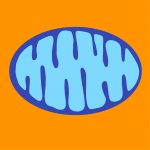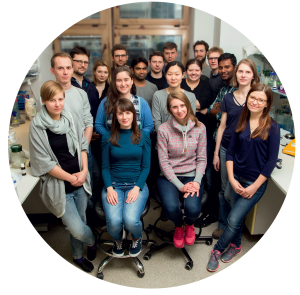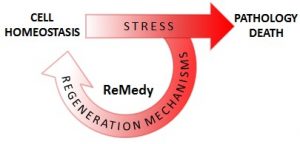
Research interest
Mitochondria play a key role in metabolism and regulatory processes within a cell. Thus, the formation of mitochondria is essential for cellular function of every being in the eukaryotic kingdom, from unicellular organisms to mammals. Mitochondria comprise 1000-1500 cellular proteins, which are synthesized outside of the mitochondria in the cytosol.
The biogenesis of mitochondria relies on the efficient import, sorting, and maturation of proteins, all governed by conserved protein translocases and other complex biological machinery.
Our research explores novel and exciting links between protein transport mechanisms and mitochondrial protein homeostasis. We postulate the presence of unique mechanisms involved in protein biogenesis that involve crosstalk between the cytosol and mitochondrial compartments.
Our goal is to better understand the complex and dynamic processes involved in the formation of functional organelles, as well as the maintenance of cellular protein homeostasis and its failures, which result in pathology.
We are always interested in highly motivated students and postdocs. Please enquire: a.chacinska@cent.uw.edu.pl
,
Postdoctoral Fellow:
Karthik Mohanraj, PhD
Alumni:
Anna Antosiewicz, PhD
Arianna Barchesi, PhD
Veronica Bazzani, MSc
Piotr Brągoszewski, PhD
Żaneta Bugajska, MSc
Piotr Chrościcki, PhD
Aleksandra Gosk, BSc
Anna Kornakiewicz, PhD
Łukasz Kowalski, MSc
Monika Kwiatkowska, MSc
Inés Juaristi Santos, MSc
Tomasz Sitarz, MSc
Vanessa Tolotto, MSc
Ulrike Topf, PhD
Barbara Uszczyńska-Ratajczak, PhD
Carlo Vascotto, PhD

Kuzniewska B., Cysewski D., Wasilewski M., Sakowska P., Milek J., Kulinski T.M., Winiarski M., Kozielewicz P., Knapska E., Dadlez M., Chacinska A., Dziembowski A., Dziembowska M.
EMBO Rep. (2020)
Kodroń A., Mussulini B.H., Pilecka I., & Chacińska A.
Pharmacological Research
Mohanraj K., Nowicka U. & Chacińska A.
Biochem J (2020) 477 (16): 3033–3054
Pacheu-Grau, D., Wasilewski, M., Oeljeklaus, S., Gibhardt, C. S., Aich, A., Chudenkova, M., ... & Rehling, P.
Journal of molecular biology, 432(7), 2067-2079
Barchiesi, A., Bazzani, V., Tolotto, V., Elancheliyan, P., Wasilewski, M., Chacinska, A., & Vascotto, C.
Journal of Molecular Biology, 432(24), 166713
Turek, M., Piechota, M., Shanmugam, N., Niklewicz, M., Kowalski, K., Chacinska, A., & Pokrzywa, W.
bioRxiv
Chojnacka, K. J., Mohanraj, K., Callegari, S., Mussulini, B. H. M., Elanchelyan, P., Gosk, A., ... & Chacińska, A.
bioRxiv
Frankish, A., Diekhans, M., Ferreira, A., Johnson, R., ... & Uszczynska-Ratajczak, B. (2019).
Nucleic Acids Research, 47(D1), D766-D773
Topf U., Uszczynska-Ratajczak B., Chacinska A. (2019).
Journal of Cell Science, 132
Mohanraj, K., Wasilewski, M., Benincá, C., Cysewski, D., Poznanski, J., Sakowska, P., Bugajska, Z., Deckers, M., Dennerlein, S., Fernandez-Vizarra, E., Rehling, P., Dadlez, M., Zeviani, M. & Chacinska, A. (2019).
EMBO Mol Med, 11(5), pii: e9561.
Pereira, G. C., Allen, W. J., Watkins, D. W., Buddrus, L., Noone, D., Liu, X., Chacińska, A., . . . Collinson, I.
Journal of Molecular Biology, 431(8), 1689-1699
Monteuuis G, Miścicka A, Świrski M, Zenad L, Niemitalo O, Wrobel L, Alam J, Chacińska A, Kastaniotis AJ, Kufel J.
Nucleic Acids Res. 47(11):5777-5791
Samluk L, Urbanska M, Kisielewska K, Mohanraj K, Kim MJ, Machnicka K, Liszewska E, Jaworski J, Chacinska A.
Mol.Biol. Cell 30(15):1864-1877. doi: 10.1091/mbc.E18-10-0628.
Topf, U., Suppanz, I., Samluk, L., Wrobel, L., Böser, A., Sakowska, P., Knapp, B., Pietrzyk, M.K., Chacinska, A. and Warscheid, B. (2018).
Nature Communications, 9(1), p.324.
Kowalski L, Bragoszewski P, Khmelinskii A, Glow E, Knop M, Chacinska A. (2018).
BMC Biol. 2018 Jun 22;16(1):66. doi: 10.1186/s12915-018-0536-1.
Samluk, L., Chroscicki, P., & Chacinska, A. (2018).
Current Opinion in Physiology
Schendzielorz, A. B., Bragoszewski, P., Naumenko, N., Gomkale, R., Schulz, C., Guiard, B., ... & Rehling, P. (2018).
Nature communications, 9(1), 4028
Sokol, A. M., Uszczynska-Ratajczak, B., Collins, M. M., Bazala, M., Topf, U.,.... & Chacinska, A. (2018).
PLoS Genetics
Lewandowska, H., Stępkowski, T. M., Męczyńska-Wielgosz, S., Sikorska, K., Sadło, J., Dudek, J., & Kruszewski, M. (2018).
Journal of inorganic biochemistry, 188, 29-37
Uszczynska-Ratajczak, B., Lagarde, J., Frankish, A., Guigó, R., & Johnson, R.
Nature Reviews Genetics, 19(9), 535-548.
Bragoszewski, P., Turek, M. and Chacinska, A. (2017)
Open biology 7, no. 4: 170007.
Gold, V. A., Chroscicki, P., Bragoszewski, P., & Chacinska, A. (2017)
EMBO reports, 18(10), 1786-1800.
| Title | Deadline for applications |
|---|---|
| PhD student in “ReMedy” International Research Agenda Unit | 08/12/2019 |
| Project Administrative Assistant | 10/08/2019 |
| Public Procurement and Financial Specialist | 30/07/2019 |
| Grant Office Specialist | 30/07/2019 |
| Postdoctoral researcher | 10/01/2019 |
| Bioinformatician / Computational Biologist | 16/12/2018 |
![]()
![]()
Project number: 2015/18/A/NZ1/00025
Project title: Cross-talk between the transport of mitochondrial proteins and cellular protein homeostasis
Project leader:
Agnieszka Chacinska, PhD, Professor
E: a.chacinska
Post-doctoral researchers:
Michal Turek, PhD
E: m.turek
Anna Antosiewicz, PhD
E: a.antosiewicz
PhD students:
Maria Śladowska, MSc
E: m.sladowska
Martyna Pietrzyk, MSc
E: m.pietrzyk
Source of funding: National Science Centre, Poland
Budget: 4 271 581 PLN
Project duration: 21.04.2016 – 20.04.2021
About the project:
Mitochondrion is a cellular compartment commonly known as “the power plant” of cells. To fulfill its various functions, this organelle needs more than one thousand cellular proteins. Yet, the majority of mitochondrial proteins are synthesized outside mitochondria in the cytosol and thus must be transported into mitochondria with the help of other proteins forming import machines. Dysfunctional mitochondrial protein import machines cause mitochondrial malfunctions, but also accumulation of precursor proteins in the cytosol. The Chacinska group discovered the role of the cytosolic degradation machinery in precursors’ clearance and the mechanism called the unfolded protein response activated by mistargeted proteins (UPRam) that protects the cell from stress caused by mistargeted mitochondrial precursor proteins accumulating in the cytosol. These processes pinpoint an important crosstalk between the state of mitochondria and regulatory mechanisms responsible for maintaining the cellular protein homeostasis. In the Maestro project, using simple model organisms, such as yeasts and worms, in addition to cultured mammalian cells, multidisciplinary approaches based on biochemistry, molecular cell biology and systems biology will be undertaken to identify and characterize the mechanisms of both, degradation of mistargeted mitochondrial proteins and the UPRam. We also aim to uncover biological consequences of these mechanisms, which are critical for homeostasis, survival and ageing at the cellular and organismal level.
Publications:
Wasilewski M., Chojnacka K., Chacinska A. (2017) Protein trafficking at the crossroads to mitochondria. Biochim Biophys Acta, 1864(1):125-137. https://doi.org/10.1016/j.bbamcr.2016.10.019
Lectures at the international conferences:
10.2018
Chacinska A.– Invited Speaker, CRC 1218 International Syposium: Mitochondrial Plasticity in Metabolism and Signalling, Max Planck Institute for Biologie of Ageing, “Guided Tour of proteins into mitochondria”, Cologne, Germany
07.2018
Chacinska A.– Invited Speaker, FASEB Conference, Protein Folding in the Cell, “Cellular protein homeostasis responses driven by mitochondria”, Buffalo, USA
Chacinska A. – Invited Speaker, The 43rd FEBS Congress, Theodor Bücher Plenary Lecture, „Mitochondria in cellular protein homeostasis”, Prague, Czech Republic
Pietrzyk M., et al. – The 43rd FEBS Congress, Poster: “Ribosome – associated quality control (RQC) in Saccharomyces cerevisiae upon oxidative stress”.
Śladowska M., et al. – Mitochondrial and Chloroplast Gordon Research Conference, Poster: “Mitochondrial protein import stress can prolong life of Caenorhabditis elegans“.
06.2018
Chacinska A. – Invited Speaker, Cell Symposia: Multifaceted Mitochondria, “The guided tour of proteins to mitochondria”, San Diego, USA
05.2018
Chacinska A. – Invited Speaker, EMBO Workshop: Molecular Biology of Mitochondria, “Mitochondria and cellular protein homeostasis mechanisms”, Stockholm, Sweden
09.2017
Chacinska A. – Invited Speaker, FEBS Congress: Protein Trafficking at the Crossroads to Mitochondria, Jerusalem, Israel
07.2017
Chacinska A. – Invited Speaker, EMBO Workshop: Mitochondrial quality control, “UPS-dependent degradation of mitochondrial precursor”, Xi’an, China
11.2016
Chacinska A. – Invited Speaker, International Conference of the Centre for Misfolding
Diseases 2016, “Protein homeostasis at the crossroads to mitochondria”,
Sevilla, Spain
11.2016
Chacinska A. – Invited Speaker, Protein Biogenesis & Mitochondrial Dynamics, “Protein
trafficking at the crossroads to mitochondria”, Baiersbronn-Obertal, Germany
09.2016
Turek M., et al. – The 2nd Congress BIO 2016: “Expanding beyond the limits”, Wroclaw, Poland
Posters at the international conferences:
09.2016
Śladowska M., Topf U., Chacinska A., Poster Session at the 7th EMBO meeting, “Effects of mitochondrial dysfunction in Caenorhabditis elegans”, Mannheim, Germany
 |
The „Regenerative Mechanisms for Health” International Research Agenda Unit (“ReMedy”) is a joint unit of the University of Warsaw and University Medical Center Göttingen at Georg-August-University Göttingen, funded by a grant by the Foundation for Polish Science. The goal of ReMedy is to understand and to harness stress‐evoked adaptability of cells at the molecular and biochemical level, in order to combat human diseases and pathologies. |
| Director: prof. Agnieszka Chacińska |
| Deputy director: prof. Magda Konarska |
| Project coordinator: Michał Wrzesiński, PhD |
| Administration Manager: Marzena Niedźwiadek, MSc |
| Project and Lab Managers: Agnieszka Gajewska, PhD, Iwona Pilecka, PhD |
| Financial Administrative Specialist: Sebastian Pomirski – Ciura, MSc |
|
ReMedy aims to:
|
|
Prof. Chacińska will seek to identify global consequences of translational inhibition in human cells. Preliminary data show that although acute stress leads to rapid inhibition of protein synthesis, this stress is not lethal and frequently cells become even more resistant to further insults. Unknown adaptive mechanisms lead to re-initiation of protein translation. Prof. Chacińska’s group will undertake a system analysis of gene expression changes that accompany dysfunctional mitochondria, aiming to identify changes in transcription various steps of mRNA biogenesis and stability, including splicing – in collaboration with the Konarska lab – as well as translation activity/recruitment of mRNA during translation initiation. Studies of the group will deliver a comprehensive gene expression profiling under mitochondrial dysfunction and will lead to a discovery of yet unknown responses and adaptive pathways that have a potential to rescue cells and organisms from organellar stress and may in general benefit cellular and organismal fitness. Prof. Konarska group will study the mechanisms by which aging or environmental signals influence the function of the splicing machinery and affect splicing outcomes. Changes in patterns of alternative splicing in higher eukaryotes are characteristic signatures of stress and disease, but little is known about the underlying mechanisms. These studies will help to understand how environmental changes or ageing affect regulation of gene expression at the splicing level. They will also help to understand the function of the spliceosome and suggest new ways to modulate it. Ultimately, the mechanisms utilized by yeast to regulate pre-mRNA splicing will also be validated in mammalian cells, and the way how they affect more complex regulation of alternative splicing will be studied in collaboration with the Chacińska group. |
 |
| ReMedy is funded by Foundation for Polish Science International Research Agendas Programme (project MAB/2017/2) under measure 4.3 “International Research Agendas“, Smart Growth Operational Programme 2014-2020. |
Michał Bazała, MSc
Veronica Bazzani, MSc
Anita Brewińska, MSc
Magdalena Chojnacka, MSc
Piotr Chrościcki, PhD
Tomasz Czerwik, MSc
Magdalena Długołęcka, MSc
Jakub Dominowski, MSc
Beata Drabarek, PhD
Aleksandra Fergin, MSc
Edyta Głów, MSc
Agnieszka Górnicka, PhD
Elżbieta Januszewicz, PhD
Inés Juaristi Santos, MSc
Magdalena Kaus-Drobek, PhD
Adrianna Łoniewska-Lwowska, PhD
Aleksandra Matusiak, MSc
Inmaculada Mora Espi, MSc
Kamila Ornoch, MSc
Sabine Poerschke, MSc
Paulina Sakowska, PhD
Anna Sokół, PhD
Małgorzata Sztolsztener, PhD
Krzysztof Tarasiuk, MSc
Vanessa Tolotto, MSc
Agata Trojanowska, MSc
Aksana Varabyova, PhD
Lidia Wróbel, PhD



